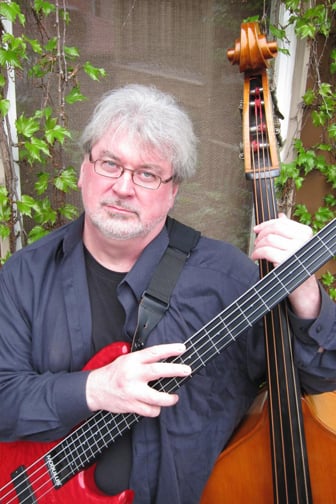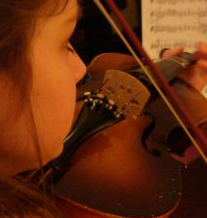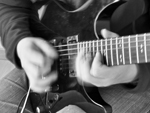Fifty years ago on October 28, 1973, my first band "Focus" played a gig in Hyde Park at the Quadrangle Club. I used to have lunch there with my father where he would point out two or three Nobel Prize laureates (not intimidating at all). This place was a home-away-from-home for some very serious world-class brain power professors (including my dad Benjamin Bloom) from the University of Chicago.
Read MoreJazz School News, Thoughts and Events.
We are very happy to announce that Steve Rodby, 13-time Grammy winner and Bloom alumnus, has joined our faculty. Steve is teaching bass (electric and upright) as well as music production and video editing.
Acoustic and electric bassist, editor and producer Steve Rodby was born in Joliet, Illinois. Steve began studying classical orchestral bass at age 10, and quickly developed an intense interest in jazz and pop music. A graduate of Northwestern University with a degree in classical bass performance, Steve studied with Warren Benfield (Chicago Symphony Orchestra), renowned jazz bassist Rufus Reid and jazz guru David Bloom. Steve has performed with numerous jazz greats, including Joe Henderson, Roy Haynes, Tony Bennett, Teddy Wilson, Milt Jackson, Art Farmer, Sonny Stitt, George Coleman, Ira Sullivan, Zoot Sims, Lee Konitz, Jackie McLean, Eddie Lockjaw Davis, Kenny Burrell, James Moody, Johnny Griffin and Monty Alexander.
In addition to being the bassist in the Pat Metheny Group for 3 decades, Steve has conducted orchestras, recorded with many other artists in both jazz and pop, and lately has spent much of his time producing and editing, both audio and video.
His work as a producer includes Oregon In Moscow (Oregon's recording with the Moscow Tchaikovsky Symphony Orchestra) which was nominated for four Grammy awards, six records by Eliane Elias - including Dreamer, Something For You, Bossa Nova Stories - and numerous non-PMG projects with Metheny, including the Jim Hall & Pat Metheny duo record, two Pat Metheny Trio records, the soundtrack for A Map Of The World and the Grammy winner One Quiet Night. He also did extensive production on two Michael Brecker recordings, Nearness Of You and the Grammy winner Pilgrimage. In all, Steve has won 13 Grammys.
Steve edited the video and audio for the Pat Metheny Group's DVDs Imaginary Day Live and The Way Up - Live, as well as other music videos, and several full length concert specials for broadcast on PBS and DVD release, including Anúna's Celtic Origins. Steve produced and edited both the audio and video for world famous classical marimba star Nancy Zeltman's latest productions, music by Messaien arranged for marimba and clarinet.
More recently, Steve worked as a producer on legendary jazz bassist Charlie Haden's Rambling Boy, performed on tour with singer/songwriter Boz Scaggs, and did production work on Maria Schneider's Grammy winning Sky Blue, as well as Pat Metheny's most recent recordings Orchestrion and Unity Band, and Grammy Award "Best New Artist" Esperanza Spalding's 2 back-to-back Grammy Award winning albums Concert Music Society and Radio Music Society.
This last year Steve produced 3 albums: Bloom mentee Ryan Cohan's The River, Eliane Elias' I Thought About You, and Internationally Recognised Aliens by The Impossible Gentlemen, a band that Steve has been touring with.
Topics: jazz courses, chicago jazz, jazz classes, bloom school of jazz
One problem you may be noticing during live performances is a lack of respect for the show. Each tune should be considered a chapter in a suspense novel, not a series of short stories with no cohesiveness. With my 40+ years of intensely studying the greatest jazz performers of the last century, I've discovered core values and practices that make the live experience of jazz infinitely more interesting and exciting for the audience.
Topics: jazz courses, jazz classes, jazz education, jazz instruction
Jazz School Experience Series: Escaping Yourself to Be You Part 3
Posted by David Bloom on Apr 20, 2011 6:06:00 PM
Escaping Yourself to Be You (Part 3)
A few specific ideas for musicians as well as civilians to help you escape both the outside and inside negative forces are as follows: For musicians, I have found that a good way to work on escaping preconceived notions, and occupying the present is to play the first two bars of the melody of a ballad twenty times, each phrasing the melody differently, but in a way that is sincere and expressive. They rhythm can be changed, the melody can be broken up differently with different length rests and dramatic dynamics can be used. But do not change the actual pitches; once you change the pitches and the rhythm it is no longer the tune that is was to begin with.
Topics: jazz courses, jazz classes, jazz school, jazz education
Jazz School Experience Series: Escaping Yourself to Be You Part 1
Posted by David Bloom on Jan 24, 2011 8:11:00 PM
Escaping Yourself to Be You (Part 1)
We live in a culture where people go to the Caymans, play Nintendo, watch TV, take drugs, booze and engage in a host of other activities in order to escape negative aspects of their life. "Getting away" is a mantra that we hear regularly from fed-up folks, who can't stand their boss, mate, relatives or whatever. When they go on vacation they feel they are being released from prison. Some people who aren't just escaping from external things, but also from bewilderment, alienation, depression and low self-esteem, think that if they change their immediate state of mind or environment they will feel better. Escaping away from something dark and debilitating can never compare with moving towards something positive. In other words, the absence of a negative force is not a positive one; it's neutral.
Jazz musicians need to escape many of the same problems, but also encounter some different ones. They have to escape from the clutches of conformity and self-consciousness, which is mandatory in jazz. It is very easy for jazz players and civilians (non-musicians) to be wooed by the allure, the promise and scale of manipulative media in order to feel like they are more sexy, more powerful, rebellious, and not left outside. But losing or attenuating one's birthright because of the external influence is not part of the jazz personality.
Great jazz players know that all they have is themselves: pure, undiluted and uncorrupted. Doing what everyone else is doing is not an option in their world. They have never made any Faustian agreements about their music and treat their talents with great respect. The average jazz player's main focus is to conform to and imitate what great jazz musicians have played. They think that if they play Coltrane's ideas then maybe they will become hip or famous too. In the jazz community you don't get significant points for merely copying Coltrane's solo. Entry into the pantheon of great jazz is strictly reserved for those who play "who they are," not for those who second-guess what they think the audience wants to hear. The jazz masters all know that individuality can't be mass-produced.
Topics: jazz courses, chicago jazz, david bloom, jazz school, jazz instruction
Listening, on the other hand, is a matter of choice. If you are talking with someone you have the option of just hearing the sounds while you think your own thoughts or actually listening to what you are hearing. To listen means that you are carefully considering everything that is being said and responding to it.
If you are a musician and you are only hearing what others are playing without listening, the results will be chaotic. The dynamics won't match, some notes will be inappropriately louder or softer than the others, the timing will not be in synch, and other problems will occur. In affect, you will not be playing with others, you will only be playing simultaneously as others play.
The potential for musical or social intimacy becomes possible when you listen to others, and impossible when you don't. A bad band sounds like they are playing in the same building but not in the same room.
In a great jazz band, everything that is played is listened to deeply in order to assess the inspirational and navigational value. While the sax player is soloing, the drummer, piano player, and bassist have many response options. They may imitate, play against or just play time without any dramatic response. When musicians listen at this deep level they are opening up access to the moment, talking musically with each other as new ideas occur.
Nothing of value can happen between musicians (or civilians) without listening, a mandatory prerequisite for successful intimate human interaction.
Topics: jazz courses, chicago jazz, practicing music, jazz school, bloom school
1.
Topics: jazz, jazz courses, chicago jazz, david bloom, practicing music
Many years ago people would ask me "How do you teach jazz?" I would tell them that it is complicated. Although there are many components -- such as chords, licks, technique, stylistic considerations etc. -- the one critical component of jazz is that it must be played spontaneously.
Topics: jazz, jazz courses, chicago jazz, jazz intro
Over the past few weeks we have put our heads down and charged ahead with creating a better online experience for those interested in the Bloom School. To mark this unveiling we have also added some new classes that may interest you.
Topics: jazz courses, chicago jazz, bloom school, jazz intro






